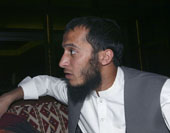New York, March 11, 2009–After the deadly attack on freelance journalist Jawed Ahmad in the southern Afghan city of Kandahar on Tuesday, the Committee to Protect Journalists called today for an aggressive investigation into the murder in order to put an end to a pattern of impunity that marked past journalist murders.
Tooryalai Wesa, the recently appointed provincial governor, said an investigation was under way. Zalmay Ayubi, Wesa’s spokesman told local and foreign journalists in the city today that it was not clear who was behind the killing. Kandahar’s provincial police chief declined to comment on the killing Tuesday.
In a statement from Iran, where he is on a state visit, President Hamid Karzai condemned the murder as “barbaric.”
According to accounts by The Canadian Press and Agence France-Presse, Ahmad, 23, was shot while driving his car on a main street in Kandahar, not far from the governor’s palace. Another car (CTV identified it as a white Toyota) pulled along the passenger side and a gunman opened fire. Ahmad died instantly, CTV said, quoting Qasim Khan, the physician who pronounced him dead. Ahmad was known by his nickname, Jojo, and also used the surname Yazemi or Yazamy.
“It isn’t premature to begin pressuring the police and governor’s office in Kandahar to vigorously pursue Jawed Ahmad’s killers,” said Bob Dietz, CPJ’s Asia program coordinator. “There has been little investigation into any number of attacks on journalists in Afghanistan, and somewhere the government must draw the line.”
CPJ research shows no conclusive investigations or prosecutions in the targeted shooting deaths of Zakia Zaki, the director of Radio Peace, a private station in Parwan province, who was killed in June 2007 or Abdul Samad Rohani, a BBC Pashto service reporter who was shot in June 2008. Several other journalists have died in bombings or crossfire in the country.
Ahmad, who freelanced for CTV and other news organizations, was held for 11 months at Bagram Air Base near Kabul until his release in September 2008. He was originally detained by Canadian forces at Kandahar’s military air base before being handed over to the U.S.-run facility at Bagram. The U.S. Department of Defense said he was being held as an “unlawful enemy combatant” and gave no explanation for his detention. CPJ had worked for his release.
